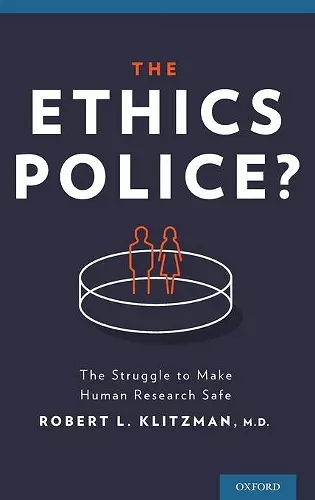The Ethics Police?
The Struggle to Make Human Research Safe
Format:Hardback
Publisher:Oxford University Press Inc
Published:14th May '15
Currently unavailable, and unfortunately no date known when it will be back

Research on human beings saves countless lives, but has at times harmed the participants. To what degree then should government regulate science, and how? The horrors of Nazi concentration camp experiments and the egregious Tuskegee syphilis study led the US government, in 1974, to establish Research Ethics Committees, known as Institutional Review Boards (IRBs) to oversee research on humans. The US now has over 4,000 IRBs, which examine yearly tens of billions of dollars of research -- all studies on people involving diseases, from cancer to autism, and behavior. Yet ethical violations persist. At the same time, critics have increasingly attacked these committees for delaying or blocking important studies. Partly, science is changing, and the current system has not kept up. Since the regulations were first conceived 40 years ago, research has burgeoned 30-fold. Studies often now include not a single university, but multiple institutions, and 40 separate IRBs thus need to approve a single project. One committee might approve a study quickly, while others require major changes, altering the scientific design, and making the comparison of data between sites difficult. Crucial dilemmas thus emerge of whether the current system should be changed, and if so, how. Yet we must first understand the status quo to know how to improve it. Unfortunately, these committees operate behind closed doors, and have received relatively little in-depth investigation. Robert Klitzman thus interviewed 45 IRB leaders and members about how they make decisions. What he heard consistently surprised him. This book reveals what Klitzman learned, providing rare glimpses into the conflicts and complexities these individuals face, defining science, assessing possible future risks and benefits of studies, and deciding how much to trust researchers -- illuminating, more broadly, how we view and interpret ethics in our lives today, and perceive and use power. These committees reflect many of the most vital tensions of our time - concerning science and human values, individual freedom, government control, and industry greed. Ultimately, as patients, scientists, or subjects, the decisions of these men and women affect us all.
The book succeeds in providing readers with an insight into a system that operates 'at complex intersections of science, politics, sociology, psychology, money and ethics'. Klitzman conveys how making human research safe is a difficult balancing act between the public's eagerness for treatments and the research community's propensity to respond. * Klaus Mitchell, Bionews.org.uk *
In this intelligent, rigorous book, Robert Klitzman looks at the morality of morality-at how the bodies set up to protect research subjects can end up injuring us all. This examination of our confused notions of safety, honesty, and transparency demonstrates that none of these is simple, and that in striving toward any one, we easily betray the others. It is a book about how seeking to do the right thing can lead to justice, and about how equally often it fails to do so. * Andrew Solomon, author of The Noonday Demon and Far From The Tree *
Few institutions in America are as powerful and yet as invisible to the public as scientific Institutional Review Boards (IRBs). In this important, pioneering book, Robert Klitzman details the challenges facing IRBs today and offers concrete proposals about how they might function better tomorrow. * Howard Gardner, Hobbs Professor of Cognition and Education, Harvard Graduate School of Education *
In this intelligent, rigorous book, Robert Kiltzman looks at the morality of morality * at how the bodies set up to protect research subjects can end up injuring us all. This examination of our confused notions of safety, honesty, and transparency demonstrates that none of these is simple, and that in striving toward any one, we easily betray the others. It is a book about how seeking to do the right thing can lead to justice, and about how equally often it fails to do so.Daniel J. Kevles, Stanley Woodward Professor of History, Yale University *
Protection of participants is an important * and inescapablepart of the contemporary world of research. In this sensitive exploration of the groups charged with that task, Robert Klitzman elucidates the complexities of human subjects protection and the reasons why it so often seems less-than-optimal. If we are ever to do better, we must begin with precisely this sort of in-depth appreciation of the challenge of balancing the advance of knowledge with the protection of our fellow human beings.Paul S. Appelbaum, MD, Elizabeth K. Dollard, Professor of Psychiatry, Medicine & Law, Columbia University *
Robert Klitzman has opened wide the door on the arcane world of institutional review boards (IRBs) and interviewed their members, chairpersons and administrators. He reports on what they think about their own power and performance and their influence on the conduct of research. Based on these perspectives, Klitzman makes the case that IRBs should be shifted to a more humanistic model that recognizes the complex psychological, social and cultural forces that influence their decisions. This is an important insight into this little understood but essential institution. * Robert J. Levine, MD, Yale University *
ISBN: 9780199364602
Dimensions: 157mm x 236mm x 38mm
Weight: 717g
432 pages